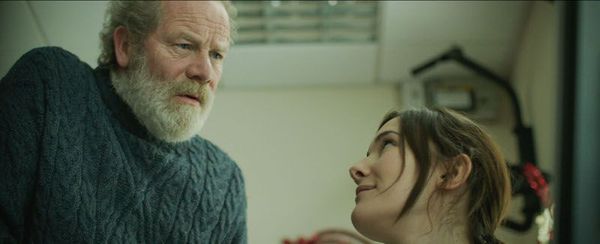Eye For Film >> Movies >> Hector (2015) Film Review
Hector
Reviewed by: Amber Wilkinson

Photographer-turned-writer-director Jake Gavin brings maturity and warmth to his debut feature about a homeless man and his attempts to reconnect with family and shows a strength of voice that bodes well for future projects. Peter Mullan stars as the titular character, whose day-to-day existence revolves around whichever motorway service station he is living in at the time.
Avoiding the too-often peddled British miserabalism, Gavin shows Hector as a man who is, at least on some level, 'in control' of his situation. He may not have a roof over his head but he is collecting a regular pension and he has a family of sorts - fellow itinerants, teenager Hazel (Natalie Gavin) and old pal Dougie (Laurie Ventry). The action takes place in the run-up to Christmas, with the wildness of the Scottish weather enhancing the sense of stoicism that clings to Hector. Gavin and his cinematographer David Raedeker pull out to show the bleakness of winter but find contrast in tight focuses on Mullan, which let the actor showcase his talents. There is a fragility to Hector - he walks with a limp - but Mullan also imbues him with a sense of purpose and humour. Later, in London, Gavin uses cityscapes to contrast the affluence of the Olympic Park with those whose main concern is finding a bed for the night.

Hector's plan to travel to a homeless hostel in London for some Christmas cheer with his buddies is briefly interrupted by a hospital appointment that prompts him to take tentative steps to find his family. What follows is a physical and mental journey, with Gavin presenting the people Hector encounters along the way in a naturalistic but generally positive light.
While the characters are no saints, there is a humanity to their actions that feels so much more realistic than many of the movies travelling the European film festival landscape at the moment. I've seen several this month alone that are concerned with debt spirals and which seem determined to heap as much pain on their protagonist as possible - to the point where it stops being remotely believable. Gavin doesn't fall into that trap, putting his previous experience of reportage - and a stint as a volunteer in a homeless hostel - to good use to paint a more complex and accurate portrait. Although he doesn't shy away from the risks faced by those on the street, he doesn't wallow in them either, concentrating instead on the way individuals make a difference to one another's lives on an everyday level. It's a refreshing change that is likely to win over audiences beyond the arthouse niche.
Reviewed on: 23 Jun 2015
















